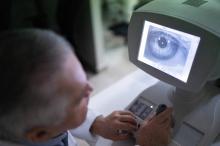UNDERSTANDING DIABETIC EYE DISEASE
High blood sugar levels damage the delicate blood vessels in the retina, which may lead to:
Retinal swelling
Blood leakage
Formation of abnormal new blood vessels
Scar tissue and retinal detachment
These complications can result in gradual vision deterioration and even blindness if untreated. Regular screenings are the only way to catch them in time.
HOW SCREENINGS HELP
Diabetic eye screening is designed to identify early signs of eye damage. The process includes:
A comprehensive eye exam with pupil dilation
High-resolution images of the retina
Tests for visual sharpness and field of vision
Advanced scans to detect structural changes
These tests are painless and efficient, giving eye care professionals the data they need to protect patients' vision.
ADVANCED TECHNOLOGY IN NORTHERN VIRGINIA OPHTHALMOLOGY CLINICS
Ophthalmology clinics in northern Virginia are equipped with:
Optical coherence tomography (OCT)
Retinal angiography
Digital retinal photography
Automated tracking of disease progression
These innovations improve accuracy and enable earlier interventions. The clinics also maintain detailed records that help monitor changes over time.
PERSONALIZED CARE FOR EVERY PATIENT
No two patients are the same. Northern virginia ophthalmology centers focus on personalized treatment strategies based on:
Duration and severity of diabetes
Age and lifestyle factors
Previous eye health history
Other coexisting conditions like hypertension
This individualized approach results in more effective care and better visual outcomes.
COLLABORATION WITH OTHER HEALTHCARE PROVIDERS
Eye doctors often coordinate with a patient’s primary care physician or endocrinologist. This integration ensures:
Unified treatment strategies
Better glucose management recommendations
Early alerts if vision changes are detected
A connected care team leads to improved diabetic outcomes overall.
WHAT YOU CAN DO TO PREVENT COMPLICATIONS
Beyond regular screenings, patients can protect their eyes by:
Keeping blood sugar levels within target range
Managing blood pressure and cholesterol
Avoiding tobacco products
Wearing protective eyewear when outdoors
Maintaining a healthy diet rich in antioxidants
Ophthalmologists guide and support these preventive efforts during appointments.
CONCLUSION
Diabetic eye screening is a vital part of diabetes management, especially given the silent nature of early eye disease. Northern virginia ophthalmology professionals offer top-tier care designed to detect and treat issues before they impact vision. By committing to annual screenings and healthy lifestyle choices, patients can preserve their sight and enjoy long-term visual wellness. Don’t wait for symptoms—take the first step toward protecting your vision today.
